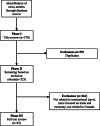Canada's response to international travel during COVID-19 pandemic - a media analysis
- PMID: 34059043
- PMCID: PMC8166365
- DOI: 10.1186/s12889-021-11082-3
Canada's response to international travel during COVID-19 pandemic - a media analysis
Abstract
Background: The media play a critical role in informing the public about the COVID-19 pandemic. Throughout the pandemic, international travel has been a highly contested subject at both the international and national levels. We examined Canadian media reporting on international travel restrictions during the pandemic, how these restrictions aligned with the International Health Regulations (IHR 2005), and how the narrative around international travel evolved over time.
Methods: We analysed articles from Canada's top three national newspapers by circulation - The Globe and Mail, The National Post and The Toronto Star - published between Jan 1, 2020 - May 31, 2020. Our search yielded a total of 378 articles across the three newspapers. After removing duplicates and screening the remaining articles, we included a total of 62 articles for the analysis. We conducted a qualitative media content analysis by using an inductive coding approach.
Results: Three major themes were identified within the articles. These included: 1) The role of scientific and expert evidence in implementing travel restrictions; 2) Federal legislation, regulation and enforcement of international travel measures; and 3) Compliance with World Health Organization (WHO) guidelines in travel restriction policy- and decision-making. The federal government relied primarily on scientific evidence for implementing international travel restrictions and fully exercised its powers under the Quarantine Act to enforce travel regulations and comply with the IHR 2005. The government embraced a rules-based international order by following WHO recommendations on international travel, contributing to a delay in border closure and travel restrictions until mid-March.
Conclusion: The media focussed significantly on international travel-related issues during the early phase of the pandemic. The dominant media narrative surrounded the need for earlier travel restrictions against international travel.
Keywords: COVID-19; Canada; IHR 2005; International travel; Travel restrictions.
Conflict of interest statement
KW has acted as a consultant for the WHO on two occasions. KSR, SM and LW declare no conflict of interests.
Figures
Similar articles
-
Latest revisions to the International Health Regulations will fail to prevent future travel chaos.BMJ Glob Health. 2025 Jan 29;10(1):e017077. doi: 10.1136/bmjgh-2024-017077. BMJ Glob Health. 2025. PMID: 39880415 Free PMC article.
-
Public health effects of travel-related policies on the COVID-19 pandemic: A mixed-methods systematic review.J Infect. 2021 Oct;83(4):413-423. doi: 10.1016/j.jinf.2021.07.017. Epub 2021 Jul 24. J Infect. 2021. PMID: 34314737 Free PMC article.
-
Ethics challenges in implementing the International Health Regulations in Pakistan during the COVID-19 pandemic.East Mediterr Health J. 2024 Jul 17;30(6):404-413. doi: 10.26719/2024.30.6.404. East Mediterr Health J. 2024. PMID: 39545290
-
Tracking the origin of early COVID-19 cases in Canada.Int J Infect Dis. 2020 Jul;96:506-508. doi: 10.1016/j.ijid.2020.05.046. Epub 2020 May 17. Int J Infect Dis. 2020. PMID: 32425633 Free PMC article.
-
Unintended health and societal consequences of international travel measures during the COVID-19 pandemic: a scoping review.J Travel Med. 2021 Oct 11;28(7):taab123. doi: 10.1093/jtm/taab123. J Travel Med. 2021. PMID: 34369562 Free PMC article.
References
-
- WHO . International Health Regulations (2005) 3 2016.
-
- Yiu RCF, Yiu CPB, Li VQT. Evaluating the WHO’s framing and crisis management strategy during the early stage of COVID-19 outbreak. Policy Des Pract. 2021;4(1):94-114. 10.1080/25741292.2020.1853337.
-
- WHO. Rolling updates on coronavirus disease (COVID-19). https://www.who.int/emergencies/diseases/novel-coronavirus-2019/events-a.... Accessed 1 Aug 2020.
-
- IOM . International Organisation for Migration. 2020. DTM-Covid19 Travel Restrictions Output — 23 March 2020.
-
- Shoichet CE. 93% of people around the world live in countries with coronavirus travel bans. 2020.
Publication types
MeSH terms
Grants and funding
LinkOut - more resources
Full Text Sources
Medical




